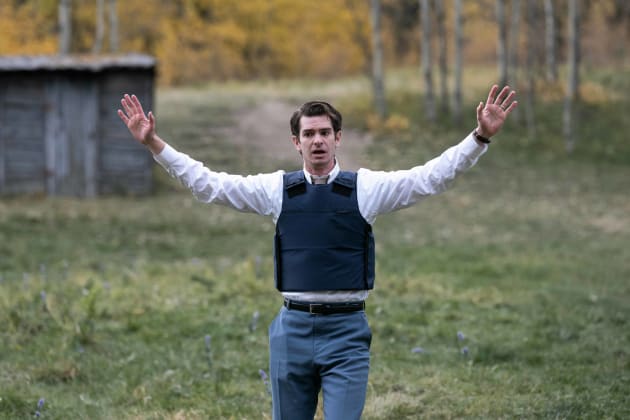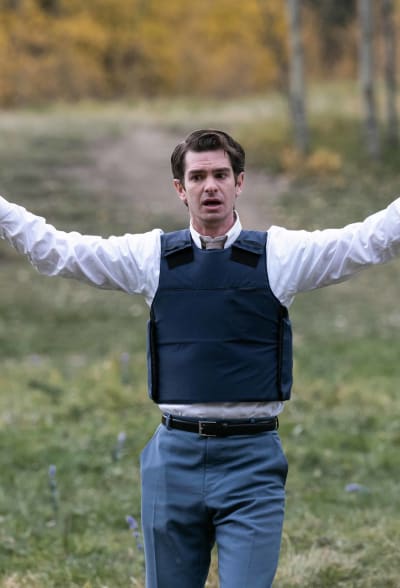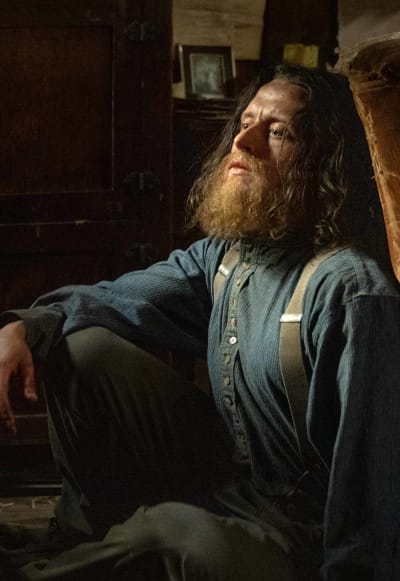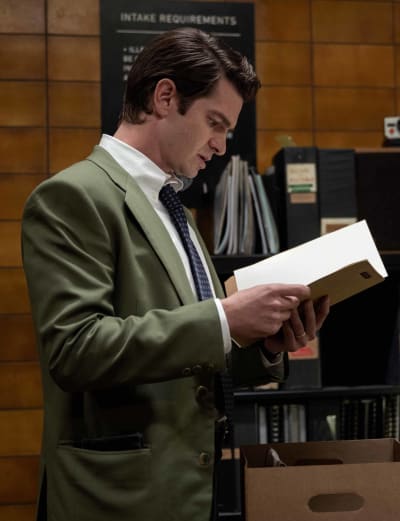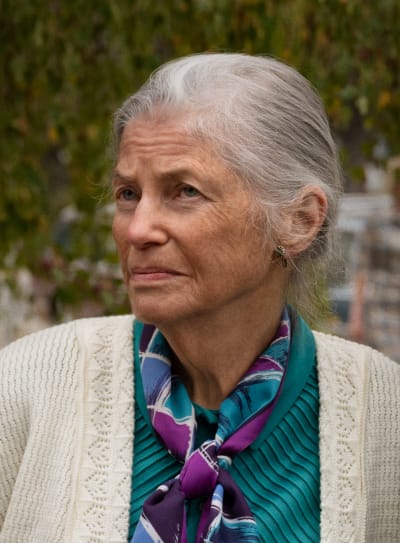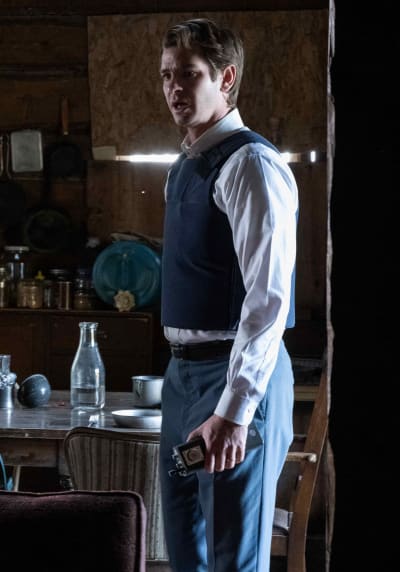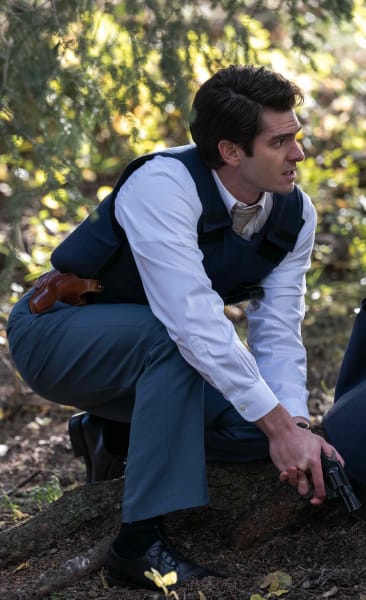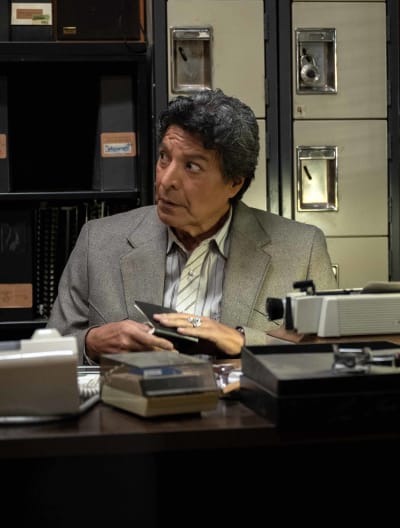It’s a battle between the fundamentalists and the law enforcement.
On Under the Banner of Heaven Season 1 Episode 3, a tense stakeout with “mountain men” leads to the apprehension of a new suspect — Sam Lafferty.
What follows is a searing take on religious masculinity and the damage inflicted by patriarchal traditions.
The first third of Episode 3 was expertly done, with mounting tension and edge-of-your-seat moments — the dog barking, the metal rattling — as Jeb inched closer to the cabin.
It was hard to know which way it would go, particularly after the capture of Jenny and Sarah. Jeb’s “Mormon insight” proved once again invaluable in the safe capture of Sam Lafferty, who has certainly changed.
Rory Culkin is so terrifying and unhinged here. He’s almost unrecognizable compared to how he appears in flashbacks. What could have led the Laffertys down this dark path in such a short time?
Ask ye of God, not me.
Samuel Lafferty
Andrew Garfield’s Detective Jeb Pyre is almost like if Mr. Rogers were a cop. He wields authority, but he’s inherently kind and always wants to believe in the good of others, particularly those that share his faith.
Pyre is by no means perfect. While he is a good man, there is implicit bias and conflict of interest in how he approaches the Lafferty case. It’s something he will no doubt wrestle with throughout the series.
Jeb is surrounded by women and girls — his mother, daughters, and wife. This case is undoubtedly going to change the way he views them. Pyre adores and appreciates them, but it’s in a protective, infantilizing way.
We’re starting to see the seeds planted in his brain here, particularly when it’s spelled out so clearly from Allen — even the kindest LDS man is still subjugating the women in his life even if he’s not physically harming them.
It shows the dangers and the insidiousness of treating women as second-class humans, of removing their autonomy, even with the intention of “protecting” them.
Pyre may see the difference between the words of the first Mormon prophets and his more modern approach, but in the end, it’s still the same religion.
I’m not a huge fan of the death of women being a catalyst for men’s growth and change, but it’s not the first time we’re seeing it, and it certainly won’t be the last.
Why this story now? Why this particular (true) story of women being subjugated and mistreated at the hands of religious fundamentalists — and moderates? Is it meant to be a reflection of the way our current society is turning?
Though Allen claims he tried to remove Brenda from the dangers his zealous family presented, it was still not enough to save her and his baby girl.
Too often, men only have these revelations about how women deserve rights after becoming fathers of daughters (and sometimes not even then).
Allen is growing more suspicious by the minute. What else is he withholding, if he didn’t share his arrest for unpaid parking citations? He only seems to be forthcoming when he is asked questions. Jeb is right not to trust him, but for the wrong reasons.
There was a lot of info-dumping courtesy of Jenny Lafferty. The story’s nonfiction roots are beginning to show — how do we get all this information out about the family organically without feeling clunky? The transitions remain smooth, but the subject matter is dense.
Our sweet wives all being told that by having dozens of children that would somehow make them more holy more righteous. Lately, I’ve started to wonder — isn’t that just another surrender that we push them into, in the name of God? I certainly didn’t see it like that at the time — that I was building Brenda a new cage, a prison — but I was, wasn’t I? But after I locked her in there, once she became pregnant, her heart changed shape.
Allen Lafferty
Brenda herself is still a mystery.
Allen’s monologue about her is poetic and heartfelt, but are the flashbacks we see true, or are they from these very unreliable narrators? Why would pregnancy switch Brenda’s motivations so strongly from wanting to pursue a career in journalism?
Who will provide the testimony that will get to the true heart of who Brenda was? My guess would be the women — Dianna or Matilda, wherever they are.
Heavenly Father’s laws are black or white. Brenda — well, she’s an ugly shade of grey.
Sarah Lafferty
From their playful banter, physical affection, and genuine declarations of love, Rebecca (Adelaide Clemens) and Jeb’s relationship dynamic seems more equal than what we’ve seen among the Laffertys.
There is love there that doesn’t feel forced but natural. Clemens and Garfield have terrific chemistry. Their scene switched from argument to romance so fast it was hard to keep up (in a good way).
I acknowledge and accept that you are indeed the man of this house and as such you are priesthood holder, but don’t you ever forget it’s me who chooses if or when I ever hold your priesthood again.
Rebecca Pyre
Rebecca treats Jeb’s mother as her own and works tirelessly to train the girls for perfection. Her sole purpose seems to be to keep her family happy, which is why it’s so devastating to her when he overrides her with his authority.
The baptism meeting and ensuing conversation were disturbing in a different way than the mountain men or the murders. Binding a child into devotion to something they cannot even understand — at age eight — seems a bit much.
No one should be making decisions at that age other than what flavor of ice cream they want.
The Bishop also did little to comfort Jeb. Jeb wants to be a good son and prevent his mother’s pain. He’s selfless in that regard — not for one second does it feel like he’s asking about the situation for his own benefit, but his family’s.
Jeb puts his mother’s needs, though he struggles to figure them out, but the Bishop centers the narrative around Jeb, which doesn’t help. One person’s suffering does not exist to be a “test” for another person.
Now, pharmaceuticals can be a life-saving tool for many people suffering from mental illnesses. Still, the way the Bishop suggested it made it seem like many unhappy LDS women could be drugged into submission.
When Jeb mentioned the case, the Bishop shut him down again, telling him not to dig further. But he’s a detective, and when you tell a detective not to go digging, you know that’s precisely what they’ll do!
Though appropriate for the situation, Jeb’s reference to the Haun’s Mill Massacre was oddly placed.
Taba was, in one sense, the audience proxy. However, he is an Indigenous man, so it seems very unlikely that he wouldn’t have a sense of how vulnerable and cornered people might feel when law enforcement outnumbered them and threatened to remove them from their land.
Even an offhand, dry comment (which would be entirely in character for Taba) would have gone a long way.
Given the checkered history of Mormons and Indigenous Americans, it felt odd not to acknowledge the parallel there. But again, that could be Jeb showing how he still has blinders on when it comes to understanding matters outside his faith.
Detective Bill Taba: What are you doing?
Detective Jeb Pyre: Proving to those inside that I’m a Mormon before I’m a cop.
In terms of the crime itself, it seems obvious that Sam was part of the group that murdered Brenda and Erica.
But is it too obvious? Is that all there is to it? We’re only three episodes in — it can’t be that cut and dry. How much deeper can we delve?
Robin believes that Sam isn’t in his right mind (which is evident enough) but that someone else could be behind it. Or maybe he just doesn’t want to believe his own brother could be responsible for such heinous acts.
Is Robin putting on a show? Is he genuinely upset that his brother did this, or is he channeling the guilt he feels from being part of it, or the fear of being caught, into this sadness?
There will be seven episodes in this limited series. So far, each one has featured the apprehension of a Lafferty man — first Allen, then Robin, and now Sam. Next, will we have Dan, Ron, Jacob, and finally, their father?
Who will be the key to solving this horrific mystery, and who are the remaining “mountain men”? Are they all Laffertys?
Do you think the case is open and shut, or is there more to it?
Share your theories and thoughts in the comments.
Mary Littlejohn is a staff writer for TV Fanatic. Follow her on Twitter.
